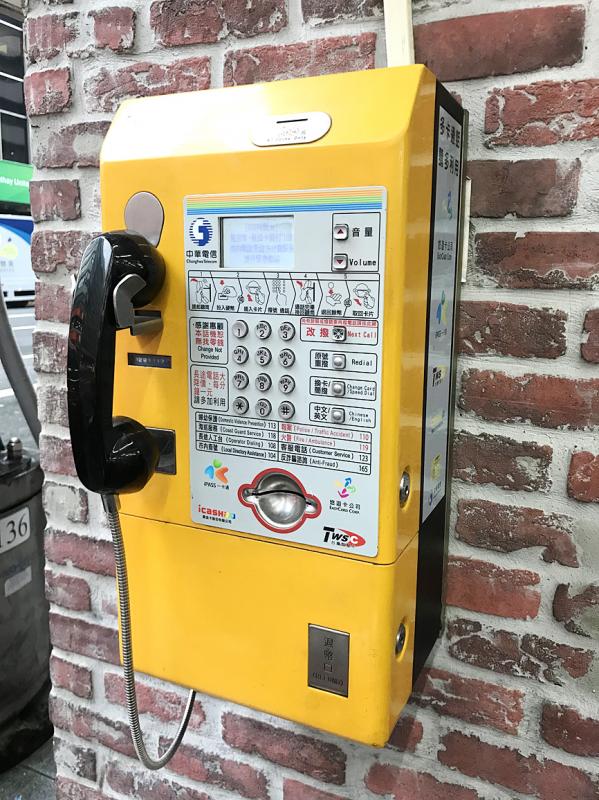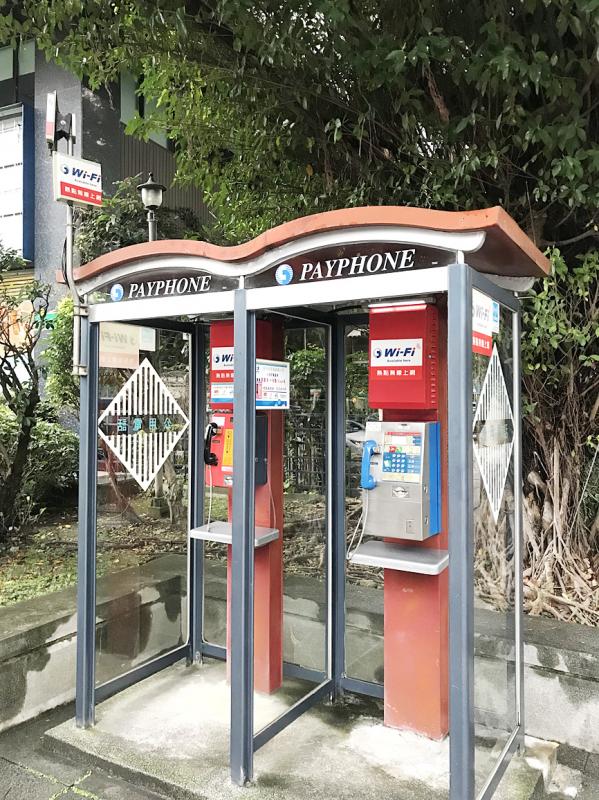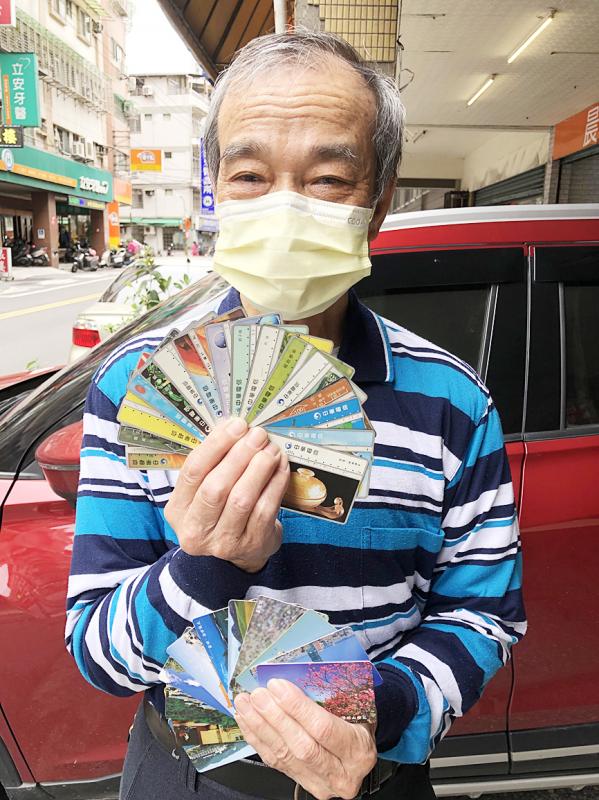The prevalence of cellphones and mobile coverage nationwide has caused most payphones to disappear from public places.
In 1999, payphones were at their peak in Taiwan, with 150,000 of them nationwide contributing a record NT$8.6 billion (US$300.56 million at the current exchange rate) from prepaid and stored-value phone cards, the National Communications Commission (NCC) said.
Last year, the nation had 36,000 payphones, the commission said.

Photo: Yang Mien-chieh, Taipei Times
An NCC report shows that Taiwan’s first public payphone was installed in 1947, while the biggest wave of installations happened in 1981, when the government ran a nationwide campaign with the slogan: “A telephone in every village.”
As mobile coverage has spread and more people have switched to cellphones, telecoms have cut operating costs by gradually removing payphones, an 80 percent decline from 1999 to last year, NCC data showed.
From 1999 to last year, payphone revenue fell 98 percent to NT$110 million, the data showed.

Photo: Yang Mien-chieh, Taipei Times
For example, payphones in Taichung have declined from a high of more than 10,000 phones to fewer than 1,000. The city’s densest concentration of payphones, at more than 400, is at the Chenggong Ling (成功嶺) military training base.
Before a local COVID-19 outbreak in May last year, each payphone at Chenggong Ling took in about NT$300 to NT$400 per month, with some taking in more than NT$1,000, NCC Vice Chairman Wong Po-tsung (翁柏宗) said.
“Although public payphone use is declining, we must still make them available to the public, because government policy is to serve rural regions and villages, and to uphold the rights of those who cannot afford a cellphone,” he said.

Photo: Yang Mien-chieh, Taipei Times
“To provide all of society with telephone access, we provide subsidies to telecoms so that rural regions have two payphones within a 200m radius and other areas have one payphone per 2km2,” he added.
The commission said that it subsidizes payphones that do not generate revenue at each primary and secondary school, hospital, railway and bus station, and mountainous area, as the public must be provided access to phone service.
In 2020, the subsidies totaled NT$87 million, it added.
Wong said that 4G coverage nationwide is 99 percent, including in rural regions.
“For example, Chunghwa Telecom offers 98.54 percent 4G coverage in rural regions and 91.24 percent 5G coverage,” Wong said.
“We will require all telecoms to expand 5G coverage and quality nationwide. Right now, we are pushing for online connection via satellite systems to resolve signal reception issues in rural regions and outlying islands,” Wong added.
Prepaid phone card sales have declined from 11.67 million cards sold for NT$2.34 billion in 2000 to 48,0000 cards sold for NT$68 million last year, a decline of more than 80 percent, NCC data showed.
Prepaid phone card collector Yang Tzu-tsai (楊子才) said he began collecting when he was young.
Yang said he would scavenge the greater Taipei area for cards that people had not bothered to retrieve from the payphone after making their call.
“My collection is of cards that Chunghwa Telecom produced for its payphones,” Yang said.
“Most of the cards have prints of unique Taiwanese architecture, like Taipei 101 and the Presidential Office Building,” he said.
Some people would collect cards with prints of natural attractions or festivals, such as the Orange Daylily Festival at Hualien County’s Lioushihdanshan (六 十石山) or the Alishan Cherry Blossom Festival, while others collected those with famous museum exhibit pieces or cultural events, such as the Donggang Boat-Burning Ceremony in Pingtung County.
Telephone booths were popular spots at most barracks, Yang said, adding that in the 1950s and 1960s, men had to do two or three years of mandatory military service, depending on their unit.
“A prepaid phone card was a must for young men in the military. Families would send cards to their sons and some local governments would hand them out as gifts,” he said.
Many stories were told of young men waiting in long payphone line to call their girlfriends, he said.
Additional reporting by Jason Pan

An essay competition jointly organized by a local writing society and a publisher affiliated with the Chinese Communist Party (CCP) might have contravened the Act Governing Relations Between the People of the Taiwan Area and the Mainland Area (臺灣地區與大陸地區人民關係條例), the Mainland Affairs Council (MAC) said on Thursday. “In this case, the partner organization is clearly an agency under the CCP’s Fujian Provincial Committee,” MAC Deputy Minister and spokesperson Liang Wen-chieh (梁文傑) said at a news briefing in Taipei. “It also involves bringing Taiwanese students to China with all-expenses-paid arrangements to attend award ceremonies and camps,” Liang said. Those two “characteristics” are typically sufficient

A magnitude 5.9 earthquake that struck about 33km off the coast of Hualien City was the "main shock" in a series of quakes in the area, with aftershocks expected over the next three days, the Central Weather Administration (CWA) said yesterday. Prior to the magnitude 5.9 quake shaking most of Taiwan at 6:53pm yesterday, six other earthquakes stronger than a magnitude of 4, starting with a magnitude 5.5 quake at 6:09pm, occurred in the area. CWA Seismological Center Director Wu Chien-fu (吳健富) confirmed that the quakes were all part of the same series and that the magnitude 5.5 temblor was

The brilliant blue waters, thick foliage and bucolic atmosphere on this seemingly idyllic archipelago deep in the Pacific Ocean belie the key role it now plays in a titanic geopolitical struggle. Palau is again on the front line as China, and the US and its allies prepare their forces in an intensifying contest for control over the Asia-Pacific region. The democratic nation of just 17,000 people hosts US-controlled airstrips and soon-to-be-completed radar installations that the US military describes as “critical” to monitoring vast swathes of water and airspace. It is also a key piece of the second island chain, a string of

The Central Weather Administration has issued a heat alert for southeastern Taiwan, warning of temperatures as high as 36°C today, while alerting some coastal areas of strong winds later in the day. Kaohsiung’s Neimen District (內門) and Pingtung County’s Neipu Township (內埔) are under an orange heat alert, which warns of temperatures as high as 36°C for three consecutive days, the CWA said, citing southwest winds. The heat would also extend to Tainan’s Nansi (楠西) and Yujing (玉井) districts, as well as Pingtung’s Gaoshu (高樹), Yanpu (鹽埔) and Majia (瑪家) townships, it said, forecasting highs of up to 36°C in those areas